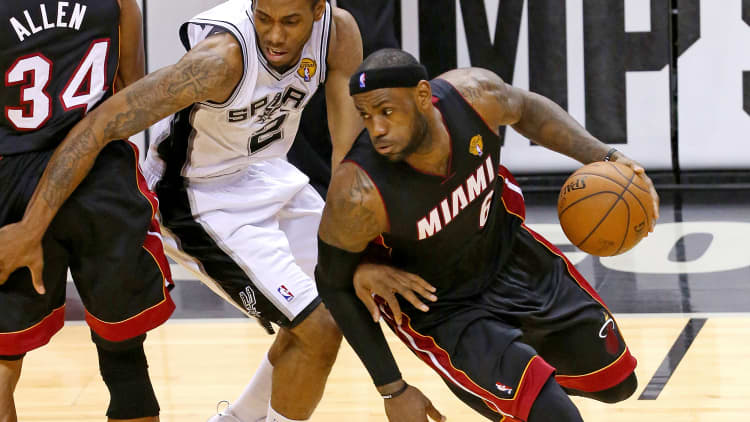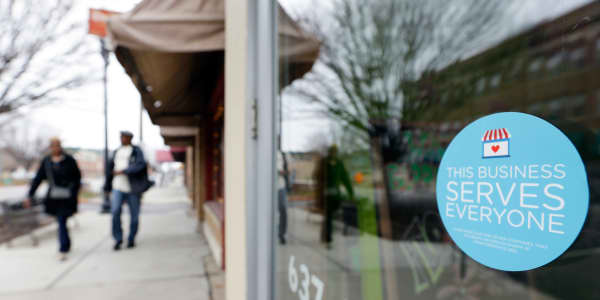


Bygones are officially bygones in Cleveland, with LeBron James, who unceremoniously dumped the city in 2010 to take his talents to South Beach, declaring now that he will be heading back to the shores of Lake Erie.
But can LeBron—not to mention the addition of Heisman Trophy winner Johnny "Johnny Football" Manziel to the Cleveland Browns' roster—help turn around the city's sluggish economy?
Is the city that was once derided as "The Mistake by the Lake" about to stage a big rebound?
Hopes are high.
"There is no doubt that Cleveland is coming back stronger today than ever before," said Cuyahoga County Executive Ed FitzGerald after Friday's announcement.
FitzGerald's office estimates James' return to the NBA's Cleveland Cavaliers will raise the team's economic impact in the region to around $500 million—roughly a 25 percent increase from where it is today. The estimate is based on increased ticket sales as well as what officials call a "multiplier effect" from the added spending.
The city is also welcoming the 2016 Republican National Convention with open arms, even though there were 16 Cleveland precincts in which Mitt Romney didn't get a single vote in 2012. FitzGerald, who is also the Democratic nominee for Ohio governor, is among the locals cheering the Republican National Committee's decision to hold its 2016 convention in Ohio. He predicts that event will add another $200 million to the local economy.
Read More10 US states on the comeback trail
Politics—and sports—are not exactly the places for dispassionate, objective analysis.
"Keep in mind the numbers," said Chris Lafakis, senior economist at Moody's Analytics. "If there's a bar that costs $4 million to build, that's going to be a drop in the bucket compared to the $3.3 billion size of Cleveland's travel and tourism economy, or the $108 billion size of its overall economy," he said.
Cue the sad trombone.
I think you're going to be hard-pressed to find too much in the data to support, historically speaking, people moving to a city where a sports superstar is.Chris Lafakissenior economist at Moody's Analytics
LeBron notwithstanding, Cleveland is still feeling the effects of the 2008 financial crisis. Racked by foreclosures, the mayor's office estimates 3,300 acres of land—more than 20,000 parcels—sit vacant. The population is declining: The city lost more than 6,500 residents, or 1.7 percent of its population, between 2010 and 2013, according to the U.S. Census Bureau.
The population decline is a major drain on Cleveland's economy.
"It's very difficult to boost demand for local services, to boost demand for housing, when you have people leaving Cleveland and going to other parts of the country," Lafakis said.
Read MoreAmerica's 10 worst states to live in
Of course, the net population outflow is about to be reduced by one LeBron James, but Lafakis is unimpressed.
"It would matter if people said, 'I want to move to Cleveland to live in the same city as LeBron James lives in,'" Lafakis said. "I think you're going to be hard-pressed to find too much in the data to support, historically speaking, people moving to a city where a sports superstar is."
That's not to say things aren't improving in Cleveland, which for many years was the rusted buckle of the Rust Belt. While still largely a manufacturing town, Cleveland's economy—like the rest of Ohio's—is diversifying. In our 2014 America's Top States for Business study, we listed Ohio among a handful of "Comeback States" following the Great Recession. The state ranks 18th in 2014 compared to 29th in 2009, thanks in large part to the effort to move beyond traditional manufacturing.
The Cleveland metropolitan area has added about 36,000 jobs in the past three years, according to the U.S. Bureau of Labor Statistics. Mayor Frank Jackson, in documents accompanying this year's city budget, said the city now counts "research firms, law firms and the health care industry among its leading employers."
And seeing as how LeBron left in 2010, when the region's economy was at its worst, it means Cleveland has made virtually all of its strides thus far without the man who refers to himself as King James.
Just imagine what Cleveland can accomplish now.
—By Scott Cohn, CNBC senior correspondent





